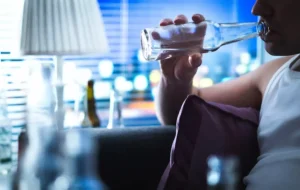
Alcohol is a nervous system depressant that affects the functioning of organs, including the eyes. When consuming alcohol in moderation, the body can metabolize it and excrete it through the liver and kidneys. In contrast, when consumption Halfway house is excessive, that often leads to a buildup of toxins causing alcohol eyesight damage and eye problems. Oftentimes even small amounts of liquor or spirits could cause puffy and bloodshot ‘alcohol eyes’.

How alcohol affects your body
Taking breaks, avoiding mixing different types of alcohol, and drinking responsibly can also help reduce the likelihood of experiencing blurry vision. In most cases, blurry vision while intoxicated is temporary and will gradually return to normal as the effects of alcohol wear off. However, if you experience persistent or severe vision changes, it is important to seek medical attention as it could be a sign of a more serious underlying condition.
Alcohol and Eyesight: A Deep Dive into the Impact on Vision
- At 0.20% and above, individuals are severely intoxicated and may experience loss of consciousness.
- Excessive alcohol also slows down the blurry vision after drinking alcohol reaction time of the pupils, meaning they cannot dilate and will constrict to allow in appropriate levels of light.
- In addition, it may have a toxic effect, which can lead to the development of conditions that impair vision.
- A person should talk with a doctor about treatment options that will work for them.
It can cause blood vessels in the eyes to dilate, leading to redness and irritation. Additionally, alcohol can cause the muscles that control the eyes to weaken, making it more difficult for the eyes to focus properly. When consumed in excessive amounts, alcohol can lead to a number of physiological effects, including impairment of vision. Alcohol affects the central nervous system, and when this system is compromised, it can lead to changes in vision, such as blurred or distorted vision. Heavy drinking also significantly increases your risk of heart and liver problems.
- When you consume alcohol, it enters your bloodstream and affects your central nervous system, which in turn can influence how your brain processes visual information.
- However, heavy binge drinking or consistent consumption above recommended levels can have detrimental effects on your vision and overall ocular health.
- Limiting alcohol intake can help maintain proper color vision and avoid these potentially hazardous misinterpretations.
- We’ll explore what happens inside your body when you drink, why it leads to dizziness and falls, and what you can do to stay safe.
Find a professional to answer your question

Heavy drinkers who smoke and have poor dietary lifestyles are also likely to develop alcoholic amblyopia, a rare case of bilateral vision loss. At 0.05% to 0.07% BAC, individuals feel ‘tipsy.’ Then at 0.08% to 0.09%, individuals experience reductions in physical coordination and should not drive. Bloodshot eyes, or red eyes, can indicate many things; allergies, infections, or lack of sleep.

Prevention and Treatment Strategies

To alleviate blurry vision after drinking, it is recommended to hydrate the body by drinking plenty of water. Using lubricating eye drops can also help relieve dry eyes and improve visual clarity. Additionally, allowing the body time to metabolize the alcohol and https://ecosoberhouse.com/ get sufficient rest can aid in resolving blurry vision. While it may not be entirely preventable, you can take steps to minimize the occurrence of blurry vision while drinking. Pace yourself and consume alcohol in moderation, stay hydrated, and eat a balanced meal before drinking.
- Research indicates that heavy drinking may increase the risk of developing this condition by contributing to oxidative stress and inflammation within the eye.
- In conclusion, blurry vision after drinking alcohol is typically a temporary condition that lasts a few hours to a day.
- Therefore, in most cases, blurry vision after drinking alcohol is temporary and should not cause long-term consequences.
Puffiness, dark circles and dry skin around the eyes
It’s another example of the impact alcohol has on your eyes that goes beyond just experiencing a temporary buzz. Scientifically speaking, alcohol affects the central nervous system, including the brain, which controls our vision. It can impair the functioning of the eye muscles and the coordination between the eyes and brain. This can lead to symptoms such as blurred or double vision, difficulty focusing, and slower eye movements. It can be quite unsettling and may cause concern for individuals experiencing it for the first time. Blurred vision can manifest in different ways, such as blurry vision after drinking alcohol a hazy or cloudy vision, difficulty focusing, or seeing double.

